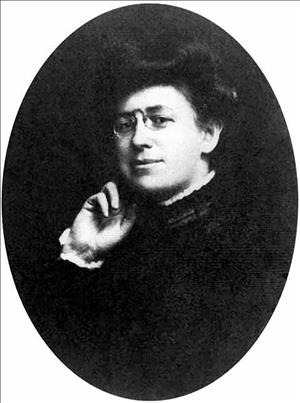On July 6, 1909, Pauline Steinem (1863-1940), chair of the National American Woman Suffrage Association's Committee on Education, delivers the committee report during the afternoon session at Plymouth Congregational Church in downtown Seattle. Steinem's theme is the importance of mothers in influencing their daughters to strive for woman suffrage and equality with men, and the importance of school textbook reform. Pauline Steinem was the grandmother of the well-known feminist leader Gloria Steinem (b. 1934). In addition to her work on the Education Committee, Pauline Steinem also served as the president of the Ohio Woman Suffrage Association and was the first female member of the Toledo Board of Education. Steinem's granddaughter, Gloria Steinem, was a cofounder of the National Woman's Caucus in 1971 and founded the feminist periodical Ms. Magazine in 1972. Gloria Steinem's father, Leo Steinem, was Pauline Steinem's son.
Buffalo Convention Reiterated
Steinem began her report by reiterating the recommendations made by the Education Committee at the organization's 1908 convention in Buffalo, New York. These included the need to utilize Mothers' Clubs and Parents' Associations in schools to push for woman suffrage. Steinem stated:
"These organizations are valuable, not only because they bring about a closer union between Home and School, but for the reason that they furnish the first incentive for women to interest themselves in things outside their own four walls. The child is closest to the mother's heart, and through it, more than through anything else, she can be awakened to a full sense of her responsibility. As soon as she realizes the conditions under which her children are growing up, she will naturally wish to better these conditions, and from School-Suffrage to Universal Suffrage is but a step" (Proceedings ..., 58).
Other recommendations were allowing both girls and boys to vote and hold office within the school setting and encouraging schools to adopt child-training plans that taught cooperation.
Textbook Reform
The rest of Steinem's report concerned the Education Committee's investigation of school textbooks, particularly History and Civics texts. The committee had written to 400 school superintendents and 26 school book publishers asking if schools would use textbooks that provided what the committee called "a fair representation of Women's work and Influence" and that were "unbiased, complete, and up-to-date" if such text books existed (Proceedings..., 59). Included in the letters was a resolution adopted by the voting membership at the Buffalo convention that included the statement: "The textbooks used in our Schools and Colleges do not show proper recognition of women's work and influence in the history and development of nations" (Proceedings ..., 59)
Steinem reported that 28 of the 79 superintendents who replied were amenable to the notion. Five replies were opposed to the idea of such textbooks, and the remaining replies were confused to varying degrees by the very question. Some responded bemusedly that the texts at their schools did mention women -- Betsy Ross, Martha Washington, Dolly Madison, and Molly Pitcher.
Steinem enumerated the publishing firms that replied: "Allyn & Bacon; The American Book Company; Ginn & Company; Houghton-Mifflin & Company; D. Appleton & Company; Eaton & Company; Silver Burdette & Company" (Proceedings ... p. 61). The textbook publishers expressed what Steinem called "their desire to meet the needs of the time" (Proceedings ... p. 61).
We Are Living Today
Pauline Steinem went on to clarify the Resolution's intent:
"... to secure a fair representation of all the influences, and all the causes, which have brought about our present state of development. Our criticism is not, that individual women have not been given the recognition they were entitled to, but that the influence of Woman, generally, has been under-estimated. We do not say that this has been done intentionally. It is simply the result of the masculine point of view, which has dominated our civilization in the past, a point of view which is apt to show itself in the writings of women as in those of men. We have no fault to find with the past; it has served its purpose; but we are living today" (Proceedings ..., 61)
History texts, Steinem pointed out, focused on men's part in making war, not on women's part in maintaining peace. Civics books, she stated, made little or no mention of the decades-long struggle for woman suffrage. She concluded, "Whether or not they approve of the movement has nothing whatever to do with the importance of the subject" (Proceedings ..., 62).

